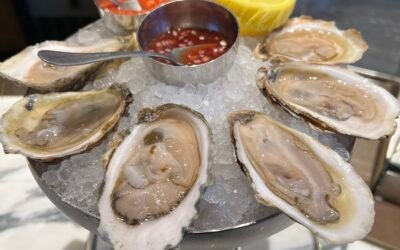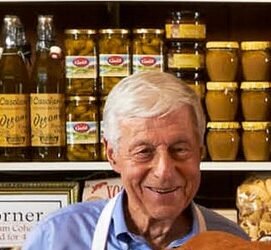Pierluigi Mazzella grew up on Italy’s island of Ischia, which lies just off the coast of Naples. His father worked as a fisherman. Pierluigi followed a different craft, falling in love with baking. After several apprenticeships in Italy, Pierluigi made his way to America. In the last few years, he opened Fatto A Mano, a micro-bakery that sells everything from panettone to sourdough specialties at markets around southern Connecticut. I was intrigued by a profile of him appearing in Bread Lines, a piece that highlighted his passion for panettone. Leaving some comments on the website, we ended up corresponding with Pierluigi offering generous encouragement to me with my own attempts at home-made panettone. Now he has agreed to come share his thoughts and life on Stir the Pots.
How did you become a bread baker?
Bread and food in general is a main part of life in Italy. Even before starting my career, I was always interested in food. I started as a Pizzaiolo when I was 16-years old. High schools in Italy are like vocational/trade schools where you have to choose a career-specific path to follow, so I did the culinary route and went to a culinary-focused school. While learning and working as a pizzaiolo in Neapolitan pizzerias, I fell in love with the art of fermentation. I decided to take classes for fermented foods like kombucha, kefir, fermented vegetables, etc. Then, I took what I had learned from those classes and used it with baking, making pizza dough out of kefir water. This interest evolved into the desire to learn about sourdough breads. I was reading books about sourdough constantly. I even volunteered to work at a small artisanal bakery in my town in Ischia just to get to work with it hands on. From there, bread making became part of my everyday routine, making it fresh for my family to have for lunch and dinner. My thirst for knowledge didn’t stop with the fermentation of bread doughs, but also into the sweet stuff. This is when panettone became my new obsession.
Is panettone a luxury and not quite a sustainable bread?
This depends on who you ask. If you ask a person that eats to live, they may say that panettone is expensive. For me though, I live to eat! I will always pay more for food that is worth it! Even if food in Ischia is cheaper compared to the US, I still always splurged and got the best panettone for the holidays. Just like with any “luxury” item, there will always be cheaper and fraudulent versions. You can find factory made panettone both here and in Italy for super cheap but there is no art or passion in that product. Though the artisanal panettone may be expensive, it earns the price because of the multiple days of hard labor and high quality ingredients. This is a product that only a select amount of bakers have successfully made!
How did you come to America and especially Monroe?
I came here by myself.. all my family is still living in Ischia. I have a son (9 yrs old) and he lives with his mother in Toronto. So the main reason to come to the United States was to get as close as possible to him.
Also I have friends in Connecticut that are from my island. They hosted me for a few weeks so I could have figure out how to stay here.. Luckily I was sponsored by an Italian restaurant in Bridgeport. I would have to work in the kitchen but mainly making Neapolitan style pizza.. so I spent one-year with a working visa before meeting the woman that’s also my wife today!
My younger brother just finished his culinary school program and is now working in a pastry shop.
He will definitely take over the baking and eventually move here to create something with me.
In Ischia, is there a mythology of its sourdough?
While there is mythology for other things in Ischia, such as the thermal and healing waters, sourdough is not one of them. Ischia follows the traditions of Naples when it comes to bread and pizza. Most of the history of food and bread in the area was created due to poverty. The neapolitans created recipes that were resourceful by using the ingredients that were ready and accessible, as well as making sure to take advantage of all parts and before they went bad.
Can your describe a bread that identifies with Naples?
Pane cafone is born in Naples. It’s a type of bread baked in the old masonry wood fired oven and it’s mainly made with Lievito madre or “criscito” (a part of old dough).It’s weight is about 1kg-1.5kg (2.2-3.30 pounds).
The crust is quite thick (allowing to hold the humidity longer) and the crumb very light and tender with regular alveoli (a sorta of the country sourdough but shaped into a rustic way).
The most interesting thing to know about this bread, is that Neapolitan people love the 2 ending parts of it. We call it “O’ CUZZETIELL.” The ends of the bread with their crunchy crumb are the shape of a cone perfect to dip it into the pot of “ragù or tomato sauce.”
Are you 100 percent sourdough for all your breads or do you mix in some dry or fresh yeast?
First, it depends on the product being made. I think that yeast is my friend and I do not consider it to be a bad addition to some products. For example, the authentic neapolitan verace pizza is made only with fresh yeast. Same for some traditional breads and pastries. Sometimes I use a preferment or hybrid method for baguettes or ciabatta. I believe that you can achieve a fantastic product even with commercial yeast as long as you respect the fermentation. On the contrary, I still love sourdough for its health benefits.
What is the difference or similarity in the steps of pizza and bread?
Bread and pizza doughs are siblings. Their ingredients are similar, yet the procedure is somewhat different. They should both be fermented properly, without any additives. I use fresh yeast for pizza but sourdough for bread. My pizza dough has a lower hydration and higher salt percentage compared to bread. Usually, the bake temperature for pizza (850F) is much higher than for bread (480F), and it also cooks in less time (traditionally less than 90 seconds).
Did you work in bakeries in Italy?
Yes, after moving from pizza to bread, I worked in a few small bakeries in my town. This led me to an apprenticeship with the panettone world champion of 2019, where my panettone journey began!
What difference do you see in baking in the United States, flour types, management of doughs, fermentation?
In the United States, the flour is much higher in protein compared to Italy. Because of this, you have to increase the hydration. I prefer to use Italian wheat over American wheat because I find it more pure, but there are a few flour companies here that I work with and like. Dough management is pretty much the same. Fermentation depends on the environment and type of flour being used. Because Connecticut is colder and drier in the winter than Ischia, I needed a proofer that gave me control of the dough, whereas in Italy, I could leave the dough out at room temperature.
Panettone was said to be traditional for the Christmas season, but has become a popular all year bread, what is your opinion?
I believe that panettone is too special of a product to not have all year round. I crave it everyday no matter if it is Christmas or not. Of course, during the holidays, it is nostalgic for me but panettone is taking a modern turn, in a good way! The world is becoming more familiar with artisanal panettone and modern methods and I believe that these need to be seen!
You said you’re going to grow your laboratory space for production, describe micro baking and your transitioning?
When I first started my cottage bakery business from my home kitchen, I did not think that it would have gotten so popular so quickly. After just a few weeks, I realized I needed to get more equipment and supplies in order to keep up with the demand. Once I started doing panettone, it literally took over my whole house! I even had a pallet of flour delivered and my wife said that it was going to be my new bed! Micro-baking takes a lot of patience for everyone involved (my family). The most important thing is keeping the quality high, which is much easier to do when baking in small batches. I am excited to transition to a larger space for the main reason being space! It is very nerve wracking to work with a time-sensitive product when you don’t have enough counter space, but I always manage to make it work. The most important part of the transition to a larger space will be making sure the quality is still at a high level, even if the batches are larger.
Are you primarily selling online and markets?
Up until the holidays in 2021, I was selling mostly online via my website and having customers pick up at my home. Once the holidays hit, I switched to pop-up events and markets in order to make it more fair for people to get panettone since the online sales were selling out in minutes! I was telling people to set alarms! For the future, I hope to be more event/market-based and also offer pre-orders.
How has the pandemic affected your business?
The pandemic has built my business! I began baking from home with a cottage food license as a side job last February. I started out by selling over social media to some local people in my town, and it blossomed from there! Word spread really fast and I upgraded to the website for bi-weekly sales. Soon people were not just coming from Monroe, but towns all over Connecticut!
Who inspires you?
My dad is my inspiration. From a young age, I always saw what a hard worker he was to provide for us. I used to go fishing with him to help out. Often when I am baking in the middle of the night, I feel like I am still with him out of the boat. I want to be to my future kids, what he was to me.
Favorite grain?
Einkorn wheat
Will you write a book?
Maybe one day!
How do you see the connections between your father’s trade as a fisherman and what you do as a baker?
Both of these are ancient and artisanal jobs. They are jobs that require true skill, strength, and a lot of passion. Without these three attributes, you wouldn’t even last a day! A true fisherman uses their attention to detail, for example, to make and fix their own fishing nets and lines. Bakers do the same when having to adjust a formula if something has changed in the environment or ingredients. Also, neither of us sleep at night. But most importantly, both jobs focus on the purity and simplicity of what we eat!













0 Comments